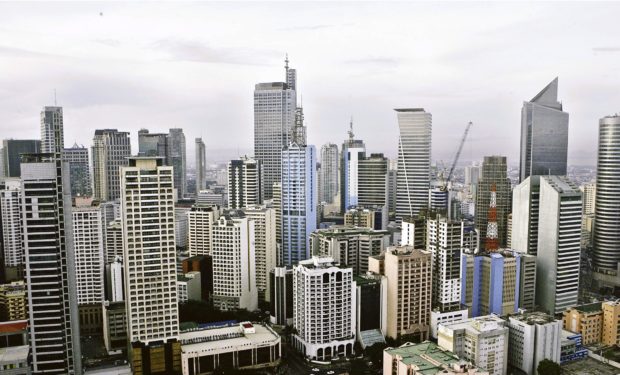
The Makati City skyline (File photo by ERNIE SARMIENTO / Philippine Daily Inquirer)
MANILA, Philippines — Foreign investors may be dissuaded by the Philippines’ grey listing in the Financial Action Task Force’s (FATF) the longer it stays there, according to Anti-Money Laundering Council (AMLC) Executive Director Matthew David on Tuesday.
The FATF is a Paris-based money laundering and terrorist financing watchdog.
Being on the FATF’s grey list means that the country has deficiencies in its Anti-Money Laundering Combating Terrorism Financing (AMLCTF) system.
“There’s already a reputational risk in the Philippines, particularly in the economy. It may affect our credit rating; as you very well know, the World Bank and even the IMF (International Monetary Fund) are looking into the status of the Philippines regarding the grey list. It may also affect foreign direct investments in the Philippines because if you don’t exit the grey list, they may think that our AMLCTF system is not adequate enough, or sufficient enough or strong enough as regards money laundering and terrorism financing,” said David in a Palace briefing.
David said that the Philippines had eight deficiencies, which he summed up into five action points that needed to be done:
- Enact effective risk-based supervision of Non-Financial Businesses and Professions (e.g. lawyers, accountants, jewelry shops, casinos, real estate developers, and brokers)
- Mitigating the risk associated with casino junkets
- Enhancing and streamlining of access to beneficial ownership information
- Increasing money laundering and terrorism financing investigations and prosecutions
- Demonstrating that cross-border measures in all main seaports and international airports
President Ferdinand “Bongbong” R. Marcos Jr. in July already issued an executive order to hasten the Philippines’ exit from the grey list.
By the end of 2023, Marcos touted P4.019 trillion in investments from his foreign travel trips. However, the Palace has yet to specify how much of these investments were pledges and how much was realized.

